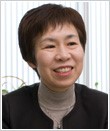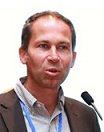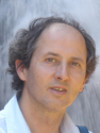
|
|
|
Plenary speakers
Nicholas A. Kotov, University of Michigan, Ann Arbor, USA Nicholas A. Kotov is Professor of Chemical Engineering at the University of Michigan in Ann Arbor since 2003. He heads the Kotov Lab and is internationally renowned for his pioneering contributions to biomimetic nanostructures. In this large interdisciplinary research fields, he has been working on the topics of layered biomimetic nanocomposites, self-assembly of nanoparticles, and chiral nanostructures. Nicholas Kotov serves as an Associate Editor for the journal ACS Nano and as an advisory board member of several other nanotechnology journals. He has received awards and recognitions from a number of different countries, international organizations, and multinational corporations. These include the 2017 Colloid Chemistry Award of the American Chemical Society, the 2016 Stephanie Kwolek Award of the Royal Society of Chemistry, the 2016 UNESCO Medal for Development of Nanoscience and Nanotechnologies or the 2014 MRS Medal. More information
Kazue Kurihara, Tohoku University, Japan Kazue Kurihara is Professor at the Tohoku University since 1997 and heads the Kurihara Laboratory (Advanced Institute for Materials Research (AIMR) and the Institute of Multidisciplinary Research for Advanced Materials (IMRAM)) focusing on Physical Chemistry, Supramolecular Chemistry and Nanotechnology). Started her carrier in the field of bio-mimetic chemistry, specifically on photoreactions in micelles and lipid bilayer liposomes, Prof. Kurihara extended her research to preparation of nanoparticles of noble metal catalysts and semiconductors in microemulsions and in vesicles, which presented very early examples of this kind of research, then to molecular recognition on surface monolayers when she demonstrated, for the first time, that the efficient hydrogen bonding interaction is possible at the air-water interface. Since early 90’s, she has been actively involved in surface forces measurement both in developing measurement methodology and understanding surface forces in liquid media. In recent years, she is well known in her study on confined liquids, for which her original resonance shear measurement is employed. This study revealed interesting properties of confined water, ionic liquids, liquid crystals, lubricant oils etc… Her achievements have been recognized by various awards including 2016 SPSJ Award for Outstanding Achievement in Polymer Science and Technology, IUPAC 2013 Distinguished Women in Chemistry or Chemical Engineering Award, A.E. Alexander Lectureship Award 2011 from Australian Chemical Society, and 2000 The Chemical Society of Japan Award for Creative Work. More information
Sébastien Lecommandoux, University of Bordeaux - INP, France Sébastien Lecommandoux is Full Professor at the University of Bordeaux (Bordeaux-INP). He is Director of the Laboratoire de Chimie des Polymères Organiques (LCPO-CNRS) and is leading the group “Polymers Self-Assembly and Life Sciences”. His research interests include polypeptide and polysaccharide based block copolymers self-assembly, the design of polymersomes for drug-delivery and theranostic, as well as biomimetic approaches toward design of synthetic viruses and artificial cells. He published more than 180 publications in international journal, 6 book chapters and 6 patents, with over 10000 citations (h-factor 52, Google Scholar). Sébastien Lecommandoux is recipient of the CNRS bronze medal (2004), Institut Universitaire de France Junior Chair (IUF 2007), Fellow of the Royal Society of Chemistry RSC (2017). He is Associate Editor of Biomacromolecules (ACS) since 2013 and in the Editorial Advisory Board of several international journals, including Bioconjugate Chemistry (ACS), Polymer Chemistry and Biomaterials Science (RSC). More information
Luis Liz-Marzán, CIC biomaGUNE, San Sebastian, Spain Luis Liz-Marzán is Ikerbasque Professor and Scientific Director of CIC biomaGUNE, in San Sebastián (Spain), since September 2012. He graduated in chemistry from the University of Santiago de Compostela, was postdoc at Utrecht University and Professor at the University of Vigo (1995–2012). He has been Invited Professor at Tohoku University, University of Michigan, University of Melbourne, University of Hamburg and the Max-Planck Institute of Colloids and Interfaces. Liz-Marzán received numerous research awards, including a Humboldt research award, ACS Nano lecture award, Medal of the Spanish Royal Society of Chemistry and ERC Advanced Grant. He is also member of the Royal Spanish Academy of Sciences and of the European Academy of Sciences. He is co-author of over 400 publications and 8 patents, has delivered over 300 invited lectures He is currently co-editor in chief of ACS Omega, has been senior editor of Langmuir and serves in the editorial boards of various other journals, including Science. His major research activity is devoted to understand the growth mechanisms of metal nanocrystals, to tailor their surface chemistry and thereby directing their self-assembly. He also works on the design of biomedical applications based on the plasmonic properties of well-defined metal nanoparticles and nanostructures, including surface enhanced Raman scattering. More information
David Pine, New York University, USA David Pine is Silver Professor of Physics and Chair of the Department of Chemical & Biomolecular Engineering at New York University. His research interests focus broadly on self-assembly of nano and mesoscale materials, with particular interests in colloids and emulsions. Recent projects include the development of patchy colloids, lock-and-key colloids, DNA-coated colloids, light-activated colloidal swimmers, and random organization of driven particle suspensions far from equilibrium. He is also interested in the optical properties of soft materials and was one of the original developers of diffusing-wave spectroscopy, a light scattering technique for probing the dynamics of optically dense multiply-scattering materials. He has taught at Haverford College, worked at Exxon Corporate Research, and held faculty positions at UCSB in chemical engineering and materials before moving to New York University in 2005. He holds an appointment as Fellow Professor of Polymer Science & Engineering at Sungkyunkwan University in South Korea. Previously he was Adjunct Professor of Chemical Engineering at KAIST in South Korea. More information
Francesco Sciortino, Universitá La Sapienza, Roma, Italy Francesco Sciortino, presently professor of condensed matter physics at Sapienza, Universita' di Roma, graduated from Palermo University in 1989. He was post-doc in the group of Prof. Eugene Stanley at Boston University (1989-1991). He then moved to C.R.S.4 in Sardinia (Italy) to work in the group of Prof. Clementi (1992) before moving to Rome in 1993 where he has been since then. During his career he has been visiting professor at Université de Bordeaux, University of Western Ontario, ESPCI Paris, New York University and Princeton University. His research interests include the physics of supercooled liquids, liquid-liquid transitions in one component system, the mechanisms of dynamic arrest (glasses and gels), self-assembly, aggregation and cluster phases in disordered systems, the physics of patchy colloids. He is author of more than 370 publications in international journals, which have received more than 18000 citations. His ISI-WOS h-index is 74. The complete list of publications is available at http://glass.phys.uniroma1.it/sciortino/publications.htm |







